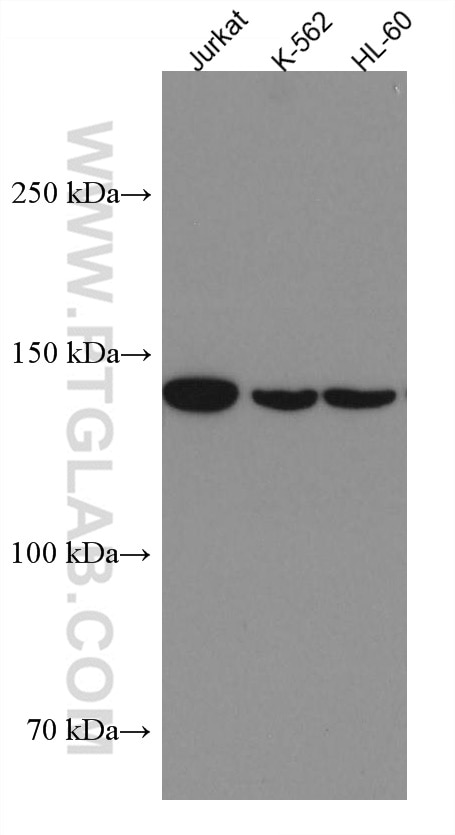FMNL1 Monoklonaler Antikörper
FMNL1 Monoklonal Antikörper für WB, ELISA
Wirt / Isotyp
Maus / IgG2b
Getestete Reaktivität
Hausschwein, human
Anwendung
WB, ELISA
Konjugation
Unkonjugiert
CloneNo.
1B12A4
Kat-Nr. : 67587-1-Ig
Synonyme
Galerie der Validierungsdaten
Geprüfte Anwendungen
| Erfolgreiche Detektion in WB | Jurkat-Zellen, Hausschwein-Thymusgewebe, HL-60-Zellen, K-562-Zellen |
Empfohlene Verdünnung
| Anwendung | Verdünnung |
|---|---|
| Western Blot (WB) | WB : 1:1000-1:6000 |
| It is recommended that this reagent should be titrated in each testing system to obtain optimal results. | |
| Sample-dependent, check data in validation data gallery | |
Produktinformation
67587-1-Ig bindet in WB, ELISA FMNL1 und zeigt Reaktivität mit Hausschwein, human
| Getestete Reaktivität | Hausschwein, human |
| Wirt / Isotyp | Maus / IgG2b |
| Klonalität | Monoklonal |
| Typ | Antikörper |
| Immunogen | FMNL1 fusion protein Ag27322 |
| Vollständiger Name | formin-like 1 |
| Beobachtetes Molekulargewicht | 140-150 kDa |
| GenBank-Zugangsnummer | BC111564 |
| Gene symbol | FMNL1 |
| Gene ID (NCBI) | 752 |
| Konjugation | Unkonjugiert |
| Form | Liquid |
| Reinigungsmethode | Protein-A-Reinigung |
| Lagerungspuffer | PBS mit 0.02% Natriumazid und 50% Glycerin pH 7.3. |
| Lagerungsbedingungen | Bei -20°C lagern. Nach dem Versand ein Jahr lang stabil Aliquotieren ist bei -20oC Lagerung nicht notwendig. 20ul Größen enthalten 0,1% BSA. |
Hintergrundinformationen
FMNL1,also named as C17orf1, C17orf1B and FMNL, belongs to the formin homology family. It may play a role in the control of cell motility and survival of macrophages. FNMLl protein may be involved in anti-apoptosis mechanisms. It is overexpressed in lymphoid malignances and is found associated with Akt. 67587-1-Ig antibody detects the protein around 140-150 kDa which is similar to the results reported in publications.(PMID: 21868368, 22986496 , 23182705)
Protokolle
| Produktspezifische Protokolle | |
|---|---|
| WB protocol for FMNL1 antibody 67587-1-Ig | Protokoll herunterladen |
| Standard-Protokolle | |
|---|---|
| Klicken Sie hier, um unsere Standardprotokolle anzuzeigen |





